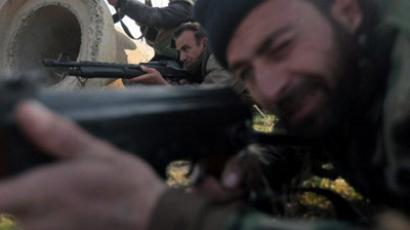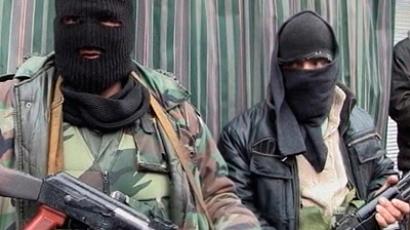UK fears homecoming of ‘London boys’ fighting in Syria
British security services said that scores of UK citizens are fighting in Syria, and may use their military know-how to wreak havoc when they return home. Syrian journalist Malik Al-Abdeh told RT British why Muslim extremists eagerly go to Syria.
A recent Home Office’s annual report titled ‘The United Kingdom’s strategy for Countering Terrorism’ highlights the growing threat that might come to the UK from Syria, where jihadists from European states have joined the ranks of the Al-Qaeda-linked armed groups to fight the government of President Bashar Assad.
“There are now hundreds of foreign fighters from Europe in
Syria. And when UK residents return here there is risk that they
may carry out attacks using the skills that they have developed
overseas,” the report claims.
Freelance Syrian journalist Malik Al-Abdeh, who joined RT in
London, pointed out that some young British citizens fighting in
Syria are actually veterans who have already fought in a war: In
Libya, where they helped oust the country’s strongman ruler Colonel
Muammar Gaddafi.
He recalled a 21-year-old British citizen of Arabic descent who recently died in Syria fighting the regime, calling him a “London boy” who, despite a British upbringing and education, found the ideals of jihad attractive. “Ultimately, it proved to be a fatal attraction because he was ultimately killed in Homs,” said Al-Abdeh, who spoke to jihadist’s friends in the UK.
The real number of Muslim Britons on the warpath in Syria could be higher than the 100-odd fighters cited in British media, Al-Abdeh said. “It depends on whether we classify them as British-born or simply happening to be living in the UK,” he explained, adding that in the second case the number could be higher.
Al-Abdeh defined “two levels of threats… There are Arabs who live in the UK or lived for a long time in the UK, who went to Libya or Syria to fight in those countries – they would be a secondary threat.”
“What would be the most concerning for the British security services are British Muslims of Asian descent – Pakistani, Bangladeshi or Indian – who might go to the places like Syria, because they are the ones who have been involved in the most dangerous terror threats in the UK over the last 10 years,” Al-Abdeh said.
Charles Farr, the director of the Office for Security and Counter-Terrorism who presented the Home Office’s annual report, estimated that between 70 and 100 Britons are fighting Assad in Syria.
The Telegraph reported on Wednesday that British-born jihadists, young converts to Islam of both Asian and African descent, “are said to have joined the fight with Jabhat al-Nusra, the country’s most militant Al-Qaeda gang.”
"We're in a potentially key moment,” said Charles Farr, the director of the Office for Security and Counter-Terrorism,
British Foreign Secretary William Hague warned in February that jihadists who had become experienced “in weapons and explosives” in war-torn Syria could return to Europe to carry out terror attacks.
Despite these concerns, Britain and France announced in mid-March their plans to put pressure on the EU to lift the arms embargo on Syria. The move comes amid the unending debate over Syria’s chemical weapons, which many countries, particularly the US and Israel, fear could fall “into the wrong hands.”
However, others point out that the Arab country, two years into its civil conflict, is slowly turning into a “Jihadist magnet” and a new real-life training ground.
Every 5 to 10 years there is a “particular location or a battlefield” where radical Muslims could go to war, Al-Abdeh explained. In the 1980s, it was Afghanistan against Soviets; in the 1990s, it was Bosnia against the Serbs and Chechnya against the Russians; today, it is Syria.
Apart from being relatively easy to travel to, Syria is a “very
attractive place to go and fight” from the Islamic point of view.
“There is a lot of historical and religious importance attached
to Syria, and to Damascus especially, the place where, it is said
in the Koran, Jesus Christ is going to come back and there will be
Armageddon and so on,” Al-Abdeh said. “Many of the jihadists
that go to fight in Syria actually believe in these things, and
that Syria has special religious significance.”














